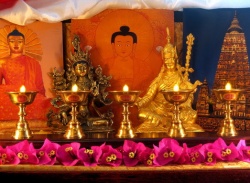Difference between revisions of "What is the purpose of making offerings to the Buddha?"
(Created page with "thumb|250px| <poem> We make offerings not because the Buddha needs them - the Buddha is an enlightened being, He certainly does not need an incense s...") |
|||
| Line 1: | Line 1: | ||
[[File:Butterlamp58.jpg|thumb|250px|]] | [[File:Butterlamp58.jpg|thumb|250px|]] | ||
<poem> | <poem> | ||
| − | We make offerings not because the Buddha needs them - the Buddha is an enlightened being, He certainly does not need an incense stick to be happy! | + | We make [[offerings]] not because the [[Buddha]] needs them - the [[Buddha]] is an [[enlightened being]], He certainly does not need an [[incense]] stick to be [[happy]]! |
| − | • Nor do we make offerings to win the Buddha's favour. The Buddha developed universal loving-kindness and compassion long ago and won't be swayed by flattery and bribery the way we ordinary beings are. | + | • Nor do we make [[offerings]] to win the [[Buddha's]] favour. The [[Buddha]] developed [[universal]] [[loving-kindness]] and [[compassion]] long ago and won't be swayed by flattery and bribery the way we ordinary [[beings]] are. |
| − | • We make offerings to create positive energy and develop good qualities such as giving with a respectful attitude and gratitude. | + | • We make [[offerings]] to create positive [[energy]] and develop good qualities such as giving with a respectful [[attitude]] and [[gratitude]]. |
| − | • Moreover, the offerings remind us of certain teachings of the Buddha. | + | • Moreover, the [[offerings]] remind us of certain [[teachings of the Buddha]]. |
| − | Offering of Light (Lamp/Candle) | + | [[Offering]] of Light (Lamp/Candle) |
| − | • Light symbolizes wisdom. | + | • Light [[symbolizes]] [[wisdom]]. |
| − | • Light drives away darkness. | + | • Light drives away {{Wiki|darkness}}. |
| − | • Similarly, the light of wisdom dispels the darkness of ignorance. | + | • Similarly, [[the light of wisdom]] dispels the {{Wiki|darkness}} of [[ignorance]]. |
| − | Offering of Incense | + | [[Offering]] of [[Incense]] |
| − | • When incense is lit, its fragrance spreads. | + | • When [[incense]] is lit, its {{Wiki|fragrance}} spreads. |
| − | • Incense symbolizes the fragrance of pure moral conduct. | + | • [[Incense]] [[symbolizes]] the {{Wiki|fragrance}} of [[pure]] [[moral conduct]]. |
• This reminds us to cultivate good conduct. | • This reminds us to cultivate good conduct. | ||
| − | Offering of Water | + | [[Offering]] of [[Water]] |
[[File:S-double1.jpg|thumb|250px|]] | [[File:S-double1.jpg|thumb|250px|]] | ||
| − | • Water symbolizes purity, clarity and calmness. | + | • [[Water]] [[symbolizes]] [[purity]], clarity and [[calmness]]. |
| − | • This reminds us to practise the Buddha's teachings, so as to cleanse our minds, which are full of desire, ill-will and ignorance, and to attain the state of purity. | + | • This reminds us to practise the [[Buddha's teachings]], so as to cleanse our [[minds]], which are full of [[desire]], [[ill-will]] and [[ignorance]], and to attain the state of [[purity]]. |
| − | Offering of Fruit | + | [[Offering]] of Fruit |
| − | • Fruit symbolizes the ultimate fruit of Enlightenment which is our goal. | + | • Fruit [[symbolizes]] the [[Wikipedia:Absolute (philosophy)|ultimate]] fruit of [[Enlightenment]] which is our goal. |
| − | • Fruit also reminds us that all actions will have their effect. | + | • Fruit also reminds us that all [[actions]] will have their effect. |
| − | Offering of Flowers | + | [[Offering]] of [[Flowers]] |
| − | • The freshness, fragrance and beauty of flowers are impermanent. | + | • The freshness, {{Wiki|fragrance}} and [[beauty]] of [[flowers]] are [[impermanent]]. |
| − | • Fresh and beautiful flowers will soon become withered, scentless and discoloured. | + | • Fresh and beautiful [[flowers]] will soon become withered, scentless and discoloured. |
| − | • This reminds us of the Buddha's teaching that all things are impermanent. | + | • This reminds us of the [[Buddha's teaching]] that all things are [[impermanent]]. |
| − | • We should value what we have now and live in the present. | + | • We should value what we have now and live in the {{Wiki|present}}. |
| − | The Lotus | + | The [[Lotus]] |
| − | The most common flower seen in Buddhist shrines, or on the base of statues, are lotuses, as they represent the potential or actuality of Enlightenment. | + | The most common [[flower]] seen in [[Buddhist]] [[shrines]], or on the base of [[statues]], are [[lotuses]], as they represent the potential or [[actuality]] of [[Enlightenment]]. |
| − | • The lotus grows out of the mud and blossoms above the water surface, yet it is not dirtied by the mud from which it grows. | + | • The [[lotus]] grows out of the mud and blossoms above the [[water]] surface, yet it is not dirtied by the mud from which it grows. |
| − | • The Buddha is likened to the lotus. Like a lotus that rises out of a muddy pond, the Buddha rose above the defilements and sufferings of life. | + | • The [[Buddha]] is likened to the [[lotus]]. Like a [[lotus]] that rises out of a muddy pond, the [[Buddha]] rose above the [[defilements]] and [[sufferings]] of [[life]]. |
| − | • We are right now surrounded by defilements and sufferings, just as the lotus seed is surrounded by dirt, mud and filth. We should rise above our defilements and sufferings, just like the lotus flower arising above the muddy water. | + | • We are right now surrounded by [[defilements]] and [[sufferings]], just as the [[lotus]] seed is surrounded by dirt, mud and filth. We should rise above our [[defilements]] and [[sufferings]], just like the [[lotus flower]] [[arising]] above the muddy [[water]]. |
| − | • This serves to remind us of our own potential Buddhahood. We may have defilements today, but we all have the potential of growing out of defilements and achieving wisdom like the Buddha. | + | • This serves to remind us of our own potential [[Buddhahood]]. We may have [[defilements]] today, but we all have the potential of growing out of [[defilements]] and achieving [[wisdom]] like the [[Buddha]]. |
</poem> | </poem> | ||
{{R}} | {{R}} | ||
Revision as of 15:09, 19 March 2014
We make offerings not because the Buddha needs them - the Buddha is an enlightened being, He certainly does not need an incense stick to be happy!
• Nor do we make offerings to win the Buddha's favour. The Buddha developed universal loving-kindness and compassion long ago and won't be swayed by flattery and bribery the way we ordinary beings are.
• We make offerings to create positive energy and develop good qualities such as giving with a respectful attitude and gratitude.
• Moreover, the offerings remind us of certain teachings of the Buddha.
Offering of Light (Lamp/Candle)
• Light symbolizes wisdom.
• Light drives away darkness.
• Similarly, the light of wisdom dispels the darkness of ignorance.
Offering of Incense
• When incense is lit, its fragrance spreads.
• Incense symbolizes the fragrance of pure moral conduct.
• This reminds us to cultivate good conduct.
Offering of Water
• Water symbolizes purity, clarity and calmness.
• This reminds us to practise the Buddha's teachings, so as to cleanse our minds, which are full of desire, ill-will and ignorance, and to attain the state of purity.
Offering of Fruit
• Fruit symbolizes the ultimate fruit of Enlightenment which is our goal.
• Fruit also reminds us that all actions will have their effect.
Offering of Flowers
• The freshness, fragrance and beauty of flowers are impermanent.
• Fresh and beautiful flowers will soon become withered, scentless and discoloured.
• This reminds us of the Buddha's teaching that all things are impermanent.
• We should value what we have now and live in the present.
The Lotus
The most common flower seen in Buddhist shrines, or on the base of statues, are lotuses, as they represent the potential or actuality of Enlightenment.
• The lotus grows out of the mud and blossoms above the water surface, yet it is not dirtied by the mud from which it grows.
• The Buddha is likened to the lotus. Like a lotus that rises out of a muddy pond, the Buddha rose above the defilements and sufferings of life.
• We are right now surrounded by defilements and sufferings, just as the lotus seed is surrounded by dirt, mud and filth. We should rise above our defilements and sufferings, just like the lotus flower arising above the muddy water.
• This serves to remind us of our own potential Buddhahood. We may have defilements today, but we all have the potential of growing out of defilements and achieving wisdom like the Buddha.

